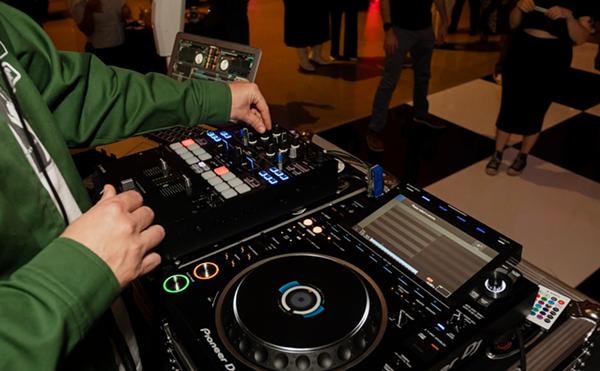Next Friday is composer Gunther Schuller's 88th birthday, but he hasn't planned a celebration. "I've had so many birthdays," he explains, "I suppose something will come up."
It doesn't seem unreasonable to ask an almost 88-year old about his retirement plans, especially since he's in Dallas preparing two area colleges for back-to-back weekend performances. But when I started to bring up the topic, Schuller interrupted me with an indignant scoff. "Retirement! I don't know the word. This is my love. This is my life! Why should I retire from it? I mean, if I'm forced to retire because I start writing crappy music or my eyesight goes or my right hand won't write anymore I suppose . . . ." He lets the sentence trail off with a mumbled profanity.
Retirement is clearly not a possibility Gunther Schuller likes to discuss, or even consider.
On a typical workday Schuller says he spends between 15 and 16 hours composing music. Most 30-year-olds I know don't work that hard when they are on deadline, even after downing a desperate Adderall and 5-Hour Energy cocktail. But, then again, Gunther Schuller is not most people.
Before he was 20, he played French horn with Arturo Toscanini and the New York Philharmonic and before he turned 30, he had recorded Birth of the Cool with Miles Davis.
Gunther Schuller is in town this week to work with wind ensemble students from UT Arlington and SMU as guest artist-in-residence. The Meadows Wind Ensemble and UTA Wind Symphony will perform together on Friday and Saturday in concerts featuring three of Schuller's compositions. Mr. Schuller will conduct their performance of his Symphony for Brass and Percussion, Op. 16.
When I spoke with Mr. Schuller this week I asked him about his symphony. "I wrote it in 1949," he began. "It is a piece for a large brass ensemble and a little bit of percussion. It was, when I wrote it, a real breakthrough piece because there had not been any good music composed for a large brass ensemble since the 16th century." With instant recall, Schuller then launched into a quick but impressively detailed outline of Giovani Gabrieli and the history of antiphonal brass ensembles in the Italian Renaissance.
Schuller began writing the Symphony for Brass and Percussion because he was frustrated with the music he and his colleagues had at their disposal. "These people I was playing with in New York," he explained, "they were great virtuosos, but apart from Gabrieli, the stuff that was available to them to play was so silly and simplistic. 'Goddammit,' I thought, 'I'm gonna write something for these folks.' And then of course it became a whole symphony with four movements. It's a very difficult piece."
Schuller has spent this week rehearsing with the SMU and UTA wind ensembles and he says "the kids are doing very well."
"Well, we've still got a few things to fix," he added.
Around the same time that Schuller was writing his Symphony for Brass and Percussion -- a piece he says has absolutely nothing to do with jazz idioms -- he began playing and recording with Miles Davis.
Sometimes the freedom of improvisation can be intimidating to classical musicians who are used to the rigidity of recreating notation on a page. Schuller admits that there were times when mixing those worlds was a challenge.
"It was a little hectic sometimes," he says, "But we all struggled. It took three years to learn to play "Moon Dreams" halfway decently. That was such an advanced breakthrough piece. It was frustrating because one or two of the players who were classically trained could read the music, but there were two or three -- I won't mention any names -- who had never encountered anything like what Gil Evans had written and so there was a struggle."
The genius of Gil Evans' music on Birth of the Cool is that it is a highly technical fusion of classical techniques and jazz improvisation, a niche that Schuller eventually settled into as a composer.
"I found out that I really did not have a very big talent for improvisation," he admits. "I'm quite sure there are people who are born to become improvisers and others well, I tried of course and I did it, but I was no Dizzy Gillespie or Miles Davis. Some of us are just, well, whatever the hell it is, we are destined to be improvisers. Others are destined to be composers."
Schuller is acutely aware of his innate talent: "When I found out that I was a very good composer but not such a great improviser I just said 'Okay, that's the way it is."
And then he went on to write over 180 highly acclaimed works, some heavily influenced by jazz, others solidly classical. He has won a Pulitzer and a MacArthur Genius Grant as well as numerous lifetime achievement awards.
And, of course, he is still writing. Because that is what he feels he was born to do. "Okay, dear, it is lovely talking to you," he tells me abruptly, "but I have a lot of work to do. Gotta go."
You can hear Schuller conduct the SMU and UTA joint performances twice, beginning tonight at SMU's Caruth Auditorium at 8 p.m., then again tomorrow night at UTA's Irons Recital Hall at 7:30 p.m.
Tickets for the SMU concert are $13 for adults, $10 for seniors and $7 for SMU students, faculty and staff. You can purchase them by calling the Meadows Ticket Office at 214-768-2787. Tickets for the UTA concert are $8 for adults and $5 for students and are available at the door.












